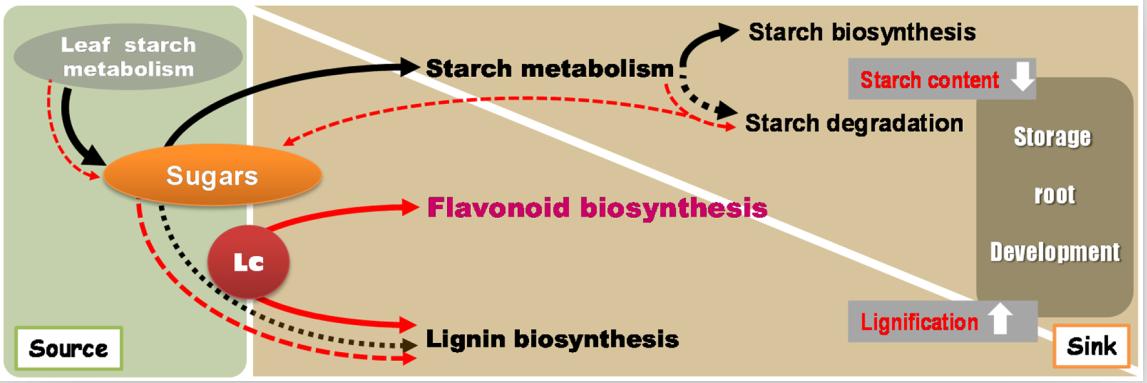
Sweet potato (Ipomoea batatas), an important root crop, provides a source of food and industrial materials for at least 800 million people globally. Much attention has been paid to the developmental regulation of its storage root. Further understanding of its mechanism related to storage root formation is of importance for improving yield in root and tuber crops.
Lignin is a class of complex organic polymers that form important structural materials in the support tissues of vascular plants. A research group led by Dr. ZHANG Peng at Institute of Plant Physiology & Ecology (SIPPE), Shanghai Institutes for Biological Sciences (SIBS), Chinese Academy of Sciences (CAS), reported that the intrinsic competition for carbohydrate source between lignin biosynthesis and starch accumulation affects the storage root development in sweet potato.
Dr. ZHANG Peng and his colleagues found that the heterologous expression of the maize leaf color (Lc) gene in sweet potato increased anthocyanin pigment accumulation in the whole plant and resulted in reduced size with an increased length/width ratio, low yield and less starch content. Expression analysis revealed dramatic up-regulation of the genes involved in the lignin biosynthesis pathway in developing storage roots, leading to greater lignin content in the Lc transgenic lines, compared to the wild type. In agreement, enhanced lignification of vascular cells in the early storage roots was observed. Mechanistically, they demonstrated that increased expression of the β-amylase gene in leaves and storage roots accelerated starch degradation and increased the sugar use efficiency, providing more energy and carbohydrate sources for lignin biosynthesis in the Lc transgenic sweet potato. Consequently, lesser starch accumulation was observed in the developing storage roots at the initiation stage in the Lc plants.
Collectively, this study, for the first time, provides direct evidence whereby the transition from lignin biosynthesis to starch biosynthesis is crucial for storage root development in sweet potato.
This work entitled “Altered Phenylpropanoid Metabolism in the Maize Lc-Expressed Sweet Potato (Ipomoea batatas) Affects Storage Root Development” was published online in Scientific Reports, a journal of Nature Publishing Group, on January 4, 2016.
This work was funded by the National High Technology Research and Development Program of China, the International Science and Technology Cooperation Program of China, and the National Natural Science Foundation of China and Shanghai government funding agencies.

Schematic illustration of the intrinsic relationship between phenylpropanoid and starch metabolisms with regard to the regulation of storage root development in sweet potato mediated by the maize Lc transcription factor. (Image by Dr. ZHANG Peng’s lab)

86-10-68597521 (day)
86-10-68597289 (night)

52 Sanlihe Rd., Xicheng District,
Beijing, China (100864)

